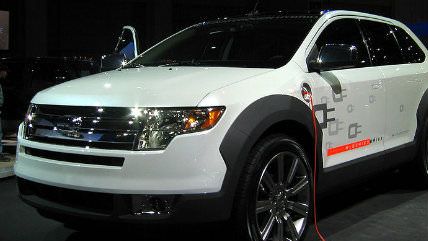The Green-Car Blues
They say virtue is its own reward. But some green-car owners seem to want a little more than that.

Virginia Gov. Bob McDonnell has drawn the fury of the environmentally minded by including in his transportation package a $100 annual fee on alternative-fuel vehicles, including electric cars and hybrids. The governor's rationale is plain enough: People who use the roads should pay for them, but taxes on gasoline don't adequately capture hybrids that burn less of it.
That didn't persuade a group of hybrid owners who held a drive-in protest at the state capitol in late January. "We should be rewarding people for trying to do their part to stop the climate crisis and lower pollution," said one. "We should be supporting people who want to (protect the environment,) not penalizing them," said another.
Two Democratic lawmakers—Del. Scott Surovell and State Sen. Adam Ebbin—took so much offense at McDonnell's proposal that they launched a petition website—NoHybridTax.com. Almost immediately, it collected more than 1,500 signatures, and by the time the legislators delivered it to the governor, it had more than 6,800. "The idea that we would tax people for being environmentally friendly is ridiculous," Surovell said a few weeks ago.
This isn't surprising. You might have noticed that some hybrid owners can be just a teensy bit self-righteous. According to a 2007 New York Times story, "The (Toyota) Prius has become, in a sense, the four-wheel equivalent of those popular rubber 'issue bracelets'… it shows the world that its owner cares. In fact, more than half of the Prius buyers surveyed this spring by CNW Marketing Research of Bandon, Ore., said the main reason they purchased their car was that 'it makes a statement about me.'" As Surovell said when delivering the petition Monday, the signers see the hybrid-car fee as "a tax on virtue."
Is the indignation about McDonnell's green-car tax justified? To some degree, yes—but it is a smaller degree than his critics think.
The indignation is partially justified because hybrid cars still burn gasoline, and still pay taxes at the pump. In that regard they do not differ from traditional-engine cars that get good mileage—such as the Smart Fortwo, the Chevy Cruze or the Ford Fiesta. But McDonnell's plan doesn't tax those cars extra; it docks only alternative-fuel vehicles. As older gas-guzzlers fade away and newer vehicles built to higher mileage standards take over, that discrepancy will look odder and odder. (Indeed, increasing fuel economy—regardless of power source—is one reason many policy wonks argue for ditching the gasoline tax in favor of a GPS-based vehicle-mile fee.)
Furthermore, the hybrid-vehicle tax is set too high, at least based on Virginia's current gasoline tax of 17.5 cents per gallon. At that rate, and assuming a motorist drives 15,000 miles a year, a standard-engine vehicle that gets 25 mph pays only $105 to the commonwealth. The same motorist driving a 50-mpg hybrid, meanwhile, pays $52.50 in gasoline taxes. To justify a $100 fee, he would have to drive an additional 28,000 miles — or get 525 miles to the gallon.
But there's a flip side. First, some green-car drivers might be greatly overstating their environmental contribution. Hybrids, for instance, are scarcely more eco-friendly than other high-mpg vehicles on the road—and, according to some analyses, might actually be worse. There's been a lot of debate about that. But even David Pogue, a technology writer for The New York Times who has hotly defended hybrids, will go no further than to say "the overall Prius environmental impact is, at worst, neutral, and at best, still positive."
Meanwhile, fully electric cars inflict a host of hidden environmental costs, according to a study by Norwegian academics. Manufacturing is much more toxic, for example. It is also carbon-intensive: Building just one electric car produces 15 tons of CO emissions. Charging the battery produces still more—so the term "zero-emission vehicle" is quite a misnomer.
As Brian Palmer noted in The Washington Post last year, "coal is the most common source of electricity in the United States, and it emits 27 percent more carbon dioxide than oil, per unit of energy produced, by some calculations." He cites a researcher at Carnegie Mellon who says electric vehicles are fine for places like Seattle, where hydroelectric plants generate much of the region's juice. In coal country? They're actually worse, at least for now. (Here in Virginia, coal and natural gas generate more than half the state's electricity; nuclear power does most of the rest.)
All of this, however, ignores the main point: Even if green cars do confer tremendous ecological benefits, they still impose considerable costs on the transportation grid, just like everyone else. A bridge can't tell whether it's carrying electric cars or gasoline-powered ones; it wears out just as fast either way. Rush-hour traffic jams don't miraculously dissipate when hybrid cars join them. You could wave a magic wand to make every car in Virginia a plug-in hybrid overnight, and the state's transportation woes would not change a single bit. How much green cars really help the environment is an interesting question. But it has nothing to do with how much they use the roads.


Show Comments (31)